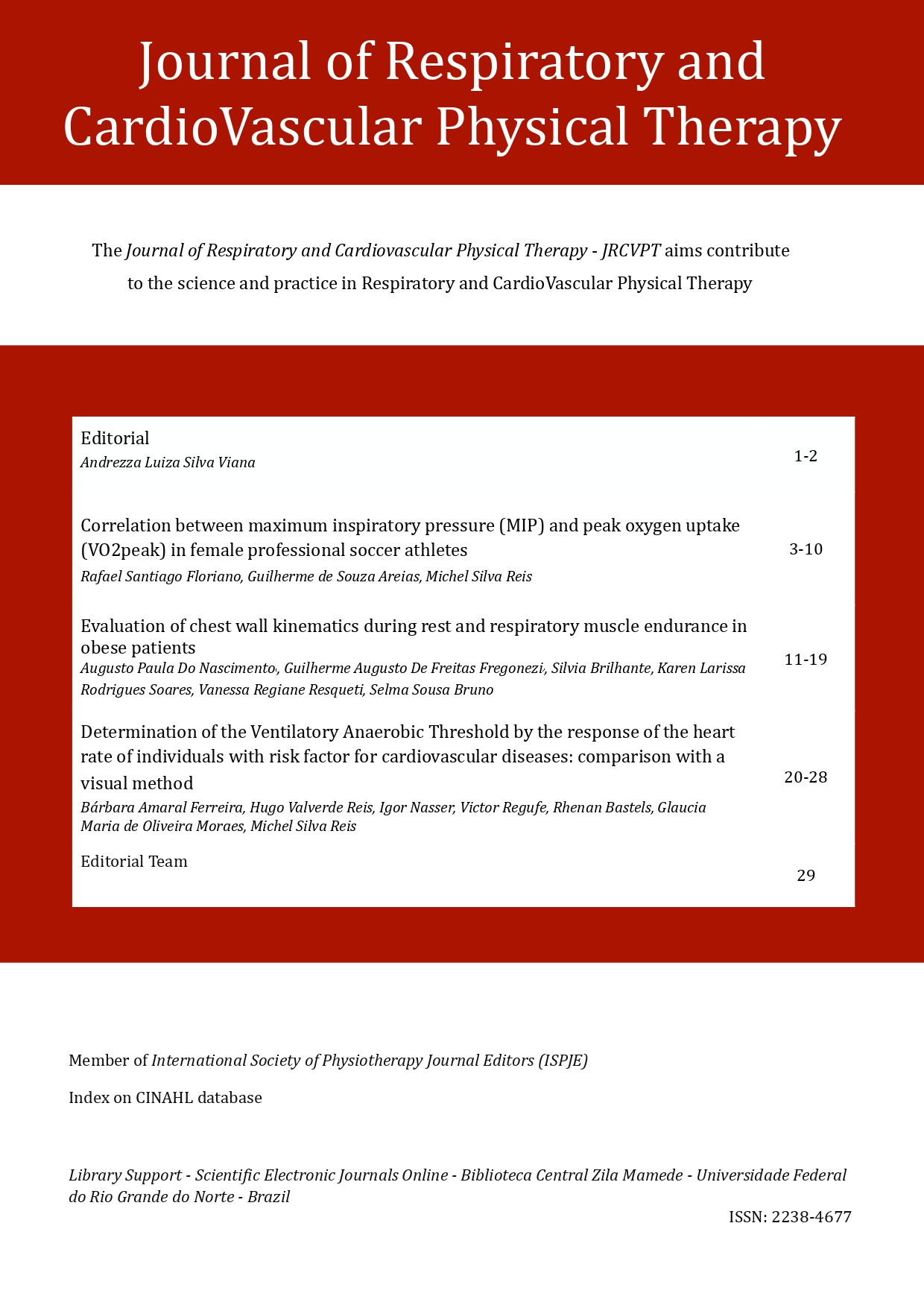CORRELATION BETWEEN MAXIMUM INSPIRATORY PRESSURE (MIP) AND PEAK OXYGEN UPTAKE (VO2 PEAK) IN FEMALE PROFESSIONAL SOCCER ATHLETES
Resumen
Background: Ventilatory muscle training (VMT) has been described as a strategy to improve ventilatory and peripheral muscle strength and endurance in athletes of different modalities. However, the mechanisms involved in this process are not fully known. Oxygen uptake (VO2) is the gold standard variable for assessing functional capacity. Oxygen (O2) to be consumed by the peripheral muscles must pass through the cardiorespiratory system. In this rationale, it seems logical that the stronger the inspiration muscles, the higher the VO2. This work has shown that this may not be as deterministic as it sounds. Objective: To evaluate the correlation between inspiratory muscle strength through maximum inspiratory pressure (MIP) and peak oxygen uptake (VO2 peak) in female professional soccer athletes. Study Design: Prospective and cross-sectional study. Methods: 16 professional soccer players, female and aged between 18 and 40 years (26 ± 4.3), underwent measurement of maximum inspiratory pressure (MIP -120.7 ± 16.9) and performed the cardiopulmonary exercise test (TECP) in a treadmill, where the ventilatory and metabolic variables were measured. One of them was the VO2 peak (44.30 ± 5.9). The volunteers were assessed on the same day and time as follows: (i) assessment of inspiratory muscle strength; and, (ii) incremental cardiopulmonary exercise test up to maximum tolerance. The data were analyzed using the SPSS® version 13.0 statistical program, and Pearson's correlation was made between MIP and VO2peak. Importance of the Study: This study can reveal what kind of correlation exists between these important markers, helping in the development of new strategies for improving performance in sport. Results: The volunteers presented a MIP of -120.7 ± 16.9, and in the TECP on a treadmill, they obtained a VO2peak of 44.30 ± 5.9. The statistical analysis showed an inverse association with r = -0.14 and p = 0.612 between MIP and VO2peak. Conclusion: There was an inversely proportional correlation between MIP and VO2peak; thus, this result leads us to believe that inspiratory muscle strength does not seem to influence VO2peak directly.
Descargas
Descargas
Publicado
Cómo citar
Número
Sección
Licencia
Copyright Transfer Statement
The author(s) of the article, as specified here, hereby transfer(s) to the Revista de Fisioterapia Respirtória e CardioVascular (Journal of Respiratory and CardioVascular Physical Therapy) all copyright ownership rights, title and interests that the author(s) may have or may come to have in and to the article and any revision or version thereof, including, but not limited to, exclusive right to print, publish and sell the article anywhere in the world, in any language and in any media.
This agreement will be considered effective and valid if and when the article is accepted for publication.
If the article contains any copyright-protected material from a third party, the author(s) must obtain written permission to reproduce the said material in the article from the copyright holder and send it to the Revista de Fisioterapia Respirtória e CardioVascular (Journal of Respiratory and CardioVascular Physical Therapy).
The author(s) guarantee(s) the holding of proprietary rights to the article; not having granted or transferred any rights to the article to any other persons or entity; that the article is susceptible to the demand for rights by its author(s); not having infringed upon any author rights, trademark or patent; not having violated the right to privacy or publicity of any person or entity; that the article does not contain any defaming subject; that the factual statements made are true or are based on reasonably accurate research; and, finally, that, the author(s) has/have no reason to believe that any of the formulas, procedures or prescriptions contained in the article will cause damage if used or followed in accordance with the instructions and warnings contained in the article.
The author(s) will indemnify the Revista de Fisioterapia Respirtória e CardioVascular (Journal of Respiratory and CardioVascular Physical Therapy) against any costs, expenses, damages or liability that the Revista de Fisioterapia Respirtória e CardioVascular (Journal of Respiratory and CardioVascular Physical Therapy) may incur as a result of accidental omissions of these guarantees. These representations and guarantees may be extended to a third party by the Revista de Fisioterapia Respirtória e CardioVascular (Journal of Respiratory and CardioVascular Physical Therapy).
Date:
Note: Each author must individually complete and sign this form
1) Author:
Signature: _________________________________
2) Author:
Signature: _________________________________
3) Author:
Signature: _________________________________
4) Author:
Signature: _________________________________
5) Author:
Signature: _________________________________
6) Author:
Signature: _________________________________
7) Author:
Signature: _________________________________
8) Author:
Signature: _________________________________




 English
English Español (España)
Español (España) Português (Brasil)
Português (Brasil) Français (Canada)
Français (Canada)